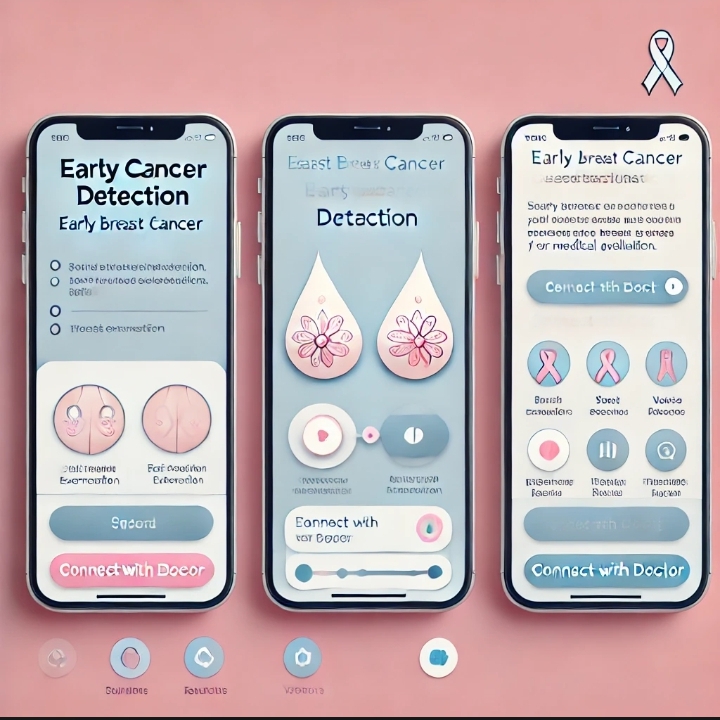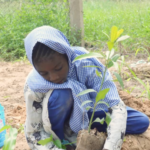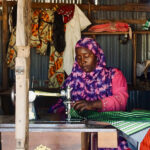Recently, Dr. Lukman Alli, an academic in the College of Health Sciences at the University of Abuja, recalled a particular haunting case from a healthcare outreach. “We were in a small rural village inside Jos for one of our regular healthcare outreach programmes,” he said. He and I remember clearly when the idea first started to form. Among the natives Dr Ali encountered was Zainab Zango, 37, who was battling with breast cancer, already in its late stages.
“I can’t shake the memory of how helpless I felt when I realised that, if she’d just had access to a simple screening tool, her story might have been different,” Dr. Ali bemoaned the memory. Without knowledge of her symptoms, Zango had relied on traditional medicine for treatment until Dr. Ali diagnosed breast cancer. All that she had left was “a few more weeks of life,” he added.
Zango’s story reflects the broader realities for a large number of Nigerian women living out of hospital reach and without proper knowledge of the symptoms they are experiencing. Disturbed by Zango’s seemingly avoidable cancer, Dr. Ali left Jos with a resolve to create an intervention.
An idea was soon forming in his head. Dr. Ali and his team launched the B-Med app for women in May 2023, in honour of Zango. “We wanted an app that any woman in any part of Nigeria could use to screen herself for breast cancer,” Dr. Ali said. B-Med is not an app built with cutting-edge technology, Dr. Ali said. Rather, the app combines a simple, intuitive interface with image guides and voice prompts to help women, even without basic medical knowledge, carry out self-examinations through step-by-step instructions.
An additional feature of the app is its integration with local healthcare systems. After self-screening, the app allows for results to be sent to a doctor for further evaluation. Together with speeding up the process of diagnosis, this synergy ensures that users can obtain urgent care in the event of an emergency without the need to travel miles for treatment.
Dr. Ali explained that the B-Med app is designed with user accessibility in mind to cater to women of varying degrees of literacy. It includes an educational module with information on risk factors and practical tips on preventing breast cancer. This is to guide its users in making informed decisions about their health and foster a proactive approach to cancer care.
Dr. Ali’s innovation has received recognition from notable stakeholders, including the Nigerian government, which has integrated the app into its national healthcare strategy. In a bid to reduce female cancer mortality, the Ministry of Health has expressed plans to scale up the app’s usage nationwide by working with healthcare providers and technology partners.
In the same vein, plans are underway to integrate the app with the National Health Insurance Scheme (NHIS), allowing women to book mammograms, including follow-up consultations, through the app at subsidised costs. This is in addition to strategic plans to ensure that the app is compatible with basic smartphones, thereby expanding screening services to areas where access to healthcare is severely limited.
By supporting the development and implementation of mHealth technologies like B-Med, the Nigerian government hopes to drastically reduce late-stage cancer diagnoses and improve survival rates for breast and cervical cancer across the country.
Indeed, the B-Med app builds on global health objectives, such as the 2030 Sustainable Development Goals, to promote early diagnosis and accessible healthcare, particularly for women in rural or underserved areas. By making early detection tools available on mobile devices, the app has the potential to save thousands of lives and drastically reduce the high mortality rates associated with breast cancer.
In the long term, the B-Med app and similar mobile health (mHealth) solutions are expected to reshape how healthcare services are delivered. As more women gain access to these technologies, the barriers to early detection, such as distance, cost, and lack of awareness, will diminish. By reducing the number of late-stage cancer diagnoses, Nigeria could significantly lower female mortality rates from breast and cervical cancers.
The B-Med app joins a widening suite of portable technologies—known as mobile health—that are increasingly being used to improve early detection. For instance, the use of portable ultrasound machines for breast cancer screenings in rural communities ensures that even the most isolated populations can have access to early-detection tools.
Public-private partnerships are also helping to fund initiatives such as the Pink October Campaign, which provides discounted or free breast cancer screenings throughout Breast Cancer Awareness Month. In 2023, this initiative reached over 10,000 women in Abuja, offering free mammograms as well as educational resources.
Delay in diagnosis is reported to pose an increased risk of advanced stages of the cancer, as seen in Zango’s case. In such stages, death is always the ultimate result.
Reducing female mortality rates from breast and cervical cancer in Nigeria requires a comprehensive approach that includes innovative healthcare solutions like the B-Med app, community engagement and strong partnerships between the public and private sectors. As more women gain access to early detection tools, Nigeria can reverse the deadly trends associated with these cancers and empower women to take charge of their health.
Dr. Lukman Alli, of the University of Abuja, was moved by the case of Zainab Zango, a woman from a rural village who succumbed to late-stage breast cancer due to a lack of early screening and reliance on traditional medicine. This experience spurred Dr. Alli to create the B-Med app, launched in May 2023, aimed at enabling women across Nigeria to screen themselves for breast cancer. The app offers a simple interface, image guides, and voice prompts to assist users in self-examinations and connects them with healthcare providers for further evaluation.
The B-Med app, designed with accessibility in mind, includes educational modules on cancer prevention and risk factors. It has gained recognition from the Nigerian government, which is integrating it into the national healthcare strategy and plans to expand its usage via the National Health Insurance Scheme. This initiative aims to improve early cancer detection, particularly in underserved areas, and reduce mortality rates.
The development of mHealth technologies like B-Med aligns with global health objectives to enhance early diagnosis and accessible healthcare. Public-private partnerships and campaigns, such as the Pink October Campaign, complement these efforts by offering free or discounted screenings. Ultimately, these innovations and collaborations aim to address the barriers to early detection and significantly reduce female mortality rates from breast and cervical cancers in Nigeria.






